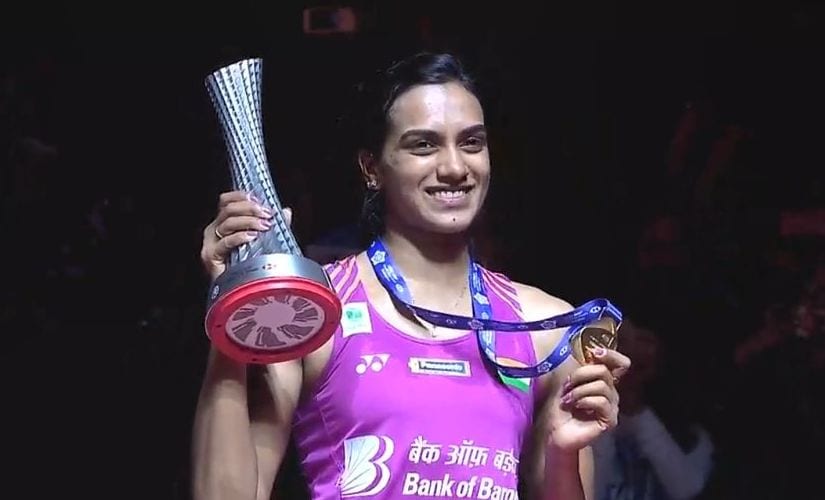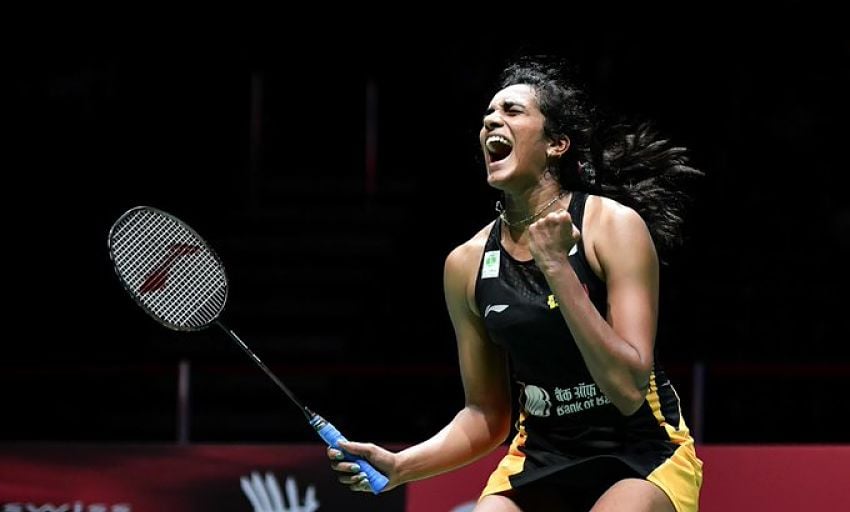Padma Vibhushan Pusarla Venkata Sindhu. There can be no doubt that the exalted title would sit well on the shoulders of the 24-year-old reigning world champion, whose name has been recommended for the coveted award. It is only the second time in India’s history that the country’s second highest civilian award is being given to a sportsperson; it would allow Sindhu’s name to be taken in the same breath as cricketing legend Sachin Tendulkar (who was subsequently conferred the Bharat Ratna title), chess wizard Viswanathan Anand and mountaineer Sir Edmund Hillary, all of whom were honoured in 2008. Sindhu’s award, if it comes through, would be richly deserved for she has been a model of consistency at the highest levels since she first made her mark as an 18 year old by bagging the bronze medal in the 2013 World Championships in Guangzhou. She had bowed out in the semi-final to yet another teenager, Ratchanok Intanon of Thailand, who would go on to capture the accolade of being the youngest women’s world champion. The following year, Sindhu repeated her feat of winning the World Championship bronze, when she surrendered in the semi-final to Spain’s Carolina Marin who went on to win the first of her three world crowns (2014, 2015 and 2018). 2015 was the only year in the sequence, that began in 2013, in which the lissome Indian failed to bag a medal at the World Championships. But in 2016, a year in which the World Championships were not held due to the Olympics in Rio de Janeiro, she powered her way to the silver medal, losing the final to the player who had become her nemesis: Marin. Sindhu could well have worn the world crown at the Emirates Arena in Glasgow in 2017. But it was not destined to be. In a heart-stopping 110-minute final that is still considered one of the finest women’s title matches of all time, the gangling Hyderabadi was pipped at the post by the diminutive Nozomi Okuhara by a 19-21, 22-20, 20-22 scoreline in an encounter neither player deserved to lose. With two World Championship bronze and a silver in her satchel, Sindhu entered the indoor arena of the Nanjing Youth Olympic Sports Park in China as a serious contender for the gold. But she was once again deprived of the honour, with Marin putting in a terrific, speedy performance to notch up a 21-19, 21-10 win and her third World Championship gold. But there was no stopping Sindhu in 2019. She arrived for the World Championships in Basel on the back of an indifferent set of results. Yet the lanky Indian somehow managed to harness the power of her mind to the power of her strokes to beat three top players in quick succession – Tai Tzu Ying, Chen Yufei and Okuhara – to finally make the gold her own. [caption id=“attachment_7761081” align=“alignnone” width=“825”]  PV Sindhu celebrates with her trophy and gold medal after beating Nozomi Okuhara. Screengrab from Hotstar.[/caption] Somehow, her narrow victory in the quarterfinals (over Tai) served to drive Sindhu into a frenzy; and she “in the zone” during the course of her final two rounds in the tournament. Chen did not know what hit her as the lanky Indian produced an unstoppable hail of smashes to demolish the Chinese star by a 21-14, 21-7 margin. Okuhara was even more bewildered in the final as the unstoppable express-train that Sindhu had become conceded just seven points per game while administering the worst pummelling that the indomitable Japanese had received in her career. It was sweet revenge for her 2017 World Championship final reverse, gained in the most authoritative manner conceivable. Aside from the World Championships and the Rio Olympics, there have been two other top-level tournaments in which Sindhu has shown her true mettle – the BWF World Tour (formerly Superseries) grand finals, at Dubai in 2017, and at Guangzhou in 2018. The Indian was runner-up to Japan’s other tiny titan Akane Yamaguchi in 2017, but was at her awesome best the following year, when she took the gold. It will be at the Tianhe Sports Centre in Guangzhou, scene of her first World Championship medal in 2013, and also one of her greatest triumphs in 2018, that Sindhu will present her credentials this week as the defending champion of the World Tour Finals. It was in this very arena that she lifted the title last December, winning five straight matches and lowering the colours of such illustrious and higher ranked players as two former world champions – 2013 winner Intanon in the semi-finals, and 2017 champ Okuhara in the summit clash. Earlier, in the group stage, Sindhu had scored over Yamaguchi (to avenge her loss from 2017), Tai (who had been the hottest player of the year with seven World Tour titles) and American Zhang Beiwen, to maintain a clean slate, going into the penultimate reckoning. All the foregoing statistics serve to showcase Sindhu’s outstanding big-match record. The flip side, however, is downright disheartening. The Indian ace has not won a second title in the ongoing year in which she captured the World Championship gold. Her results in the five tournaments she has participated in since her Basel triumph in August have been defeats in two opening rounds and two second rounds, with one narrow quarter-final loss to Tai at the French Open in Paris being her best showing. Sadly, Sindhu has been consistent in losing matches at early stages of these ‘relatively unimportant’ tournaments – like at the China Open, to a player outside the top-15, Thailand’s 17th ranked Pornpawee Chochuwong, whom she had beaten convincingly on all the three earlier occasions they had met. [caption id=“attachment_7223581” align=“alignnone” width=“850”]  PV Sindhu in action during the World Championships in Basel.[/caption] Even in 2018, she bagged the silver behind Tai in the Asian Games and again the runner-up spot behind compatriot Saina Nehwal in the Commonwealth Games. Her last title wins in the second tier tournaments (including some Super 1000 events) were at the 2017 Korea and India Opens, at the expense of Okuhara and Marin, respectively. Putting that little bit extra into her training just before the major events will help Sindhu to bridge that gap – as she has managed to do on so many earlier occasions. Sindhu is not a Tai Tzu Ying or a Carolina Marin. It is simply not possible for her to maintain that high level of speed and fitness throughout the sorely taxing season. Incidentally, Sindhu’s entry into an event that features the eight best and most consistent players in the world in all five events was on the strength of a technicality. Normally, on the strength of her 15th rank in the Race to Guangzhou standings, she would not have made the grade. However, her World Championship triumph guaranteed her a berth in the eight-woman field at the grand finals. Sindhu’s past record shows that her competitive juices begin to flow at a top-tier tournament. The Indian shuttle queen’s fans can expect her to put in that extra effort before the World Tour finals, where she will enter the fray as the defending champion.
In 2018, PV Sindhu became the first Indian to win the season-ending World Tour Finals. She enters this edition as the World Champion to go with it.
Advertisement
End of Article


)

)
)
)
)
)
)
)
)



